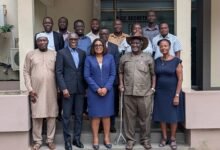
The Greater Accra Regional Health Directorate has begun registration of more than 1.5 million households to distribute to them Long-Lasting Insecticide-Treated Nets (LLINs) in the fight against malaria.
The seven-day campaign, which commenced on Monday, November 15, is expected to end on Sunday, November 21, 2021.
The Greater Accra Regional Director of Health Services, Dr Charity Sarpong, disclosed this at a stakeholders meeting on the 2021 point mass distribution of LLINs in Accra on Tuesday.
She said about 3.4 million of the LLINs were expected to be distributed to a targeted population of 6,183,032 in the region.
Dr Sarpong indicated that, unlike campaigns in the past where the LLINs were limited to only the pregnant women and their children under the age of five years, this year’s campaign would target everyone within the region.
“This year, the entire populace in Greater Accra Region is supposed to have access to a long lasting insecticide treated net to ensure that we break contact with the vector,” she said.
She explained that trained Registration Assistants with a GHS Identification name tag would move from house-to-house to register residents and urged the populace to ensure there was someone present at home during the period to provide the needed information.
She announced that members of each household were expected to provide a valid Identification card, such as a Voters Identification Card, National Identification Card (Ghana Card) or National Health Insurance Card.
“Also, members who do not have any of the listed cards will be able to register,” she added.
According to her, upon registration, a unique number would be provided and would be used for collection of the LLINs at designated points.
She entreated the public to corporate with the GHS on the exercise to achieve a zero malaria status.
The Regional Malaria Control Focal Person for Greater Accra, Dr Abena Okoh, added that the goal of the National Malaria Program was to protect about 80 per cent of Ghana’s population with effective malaria intervention.
She said Ghana for a long time had been at the control stage and measures were in place to move the country gradually to the elimination stage “where we can have zero malaria.”
“The LLINs are one of the main vector control methods that we deploy within the country,” she added.
Dr Okoh added that the GHS would be using the Universal Principle which state that, two people in a household would get one net, to distribute the LLINs.
She said the GHS had been able to reduce the burden of malaria from 74.33 percent in 2020 to 68.71 per cent this year of the Out Patient Department (OPD) cases.
However, she said the total number of malaria related deaths for the year was 14.
BY VIVIAN ARTHUR & JESSEL LARTEY THERSON-COFIE






